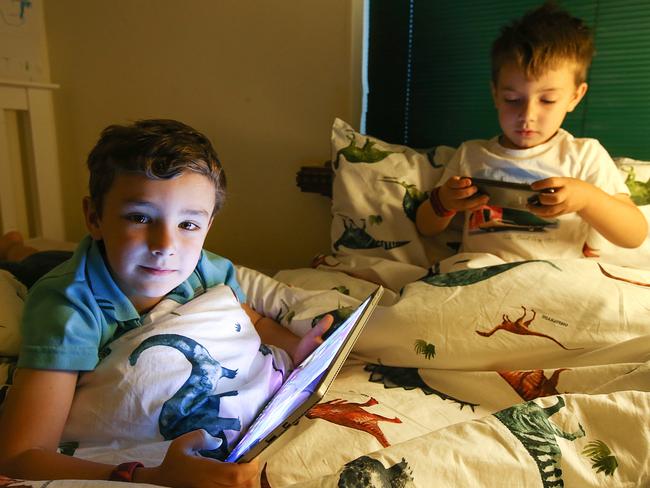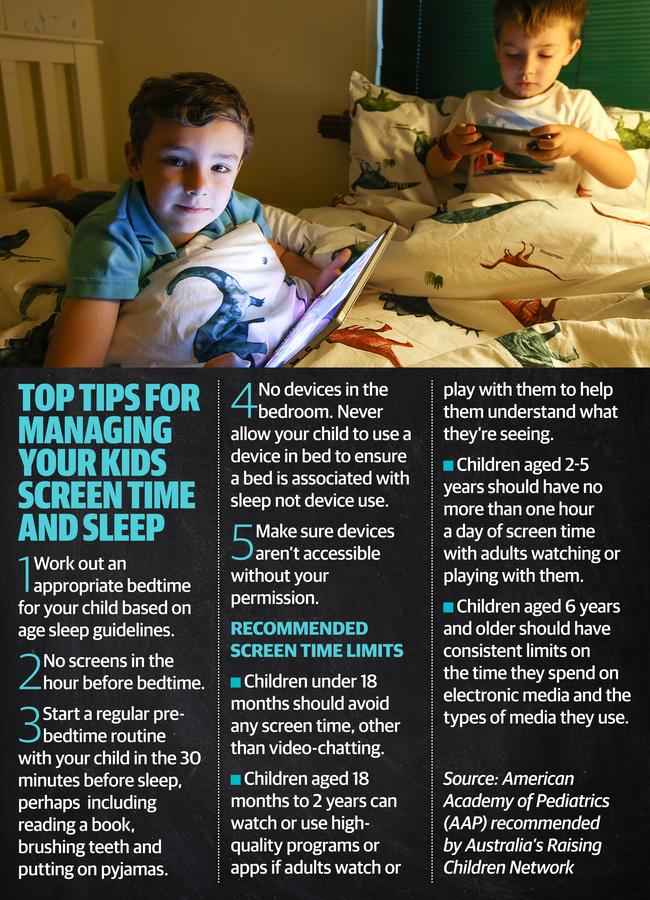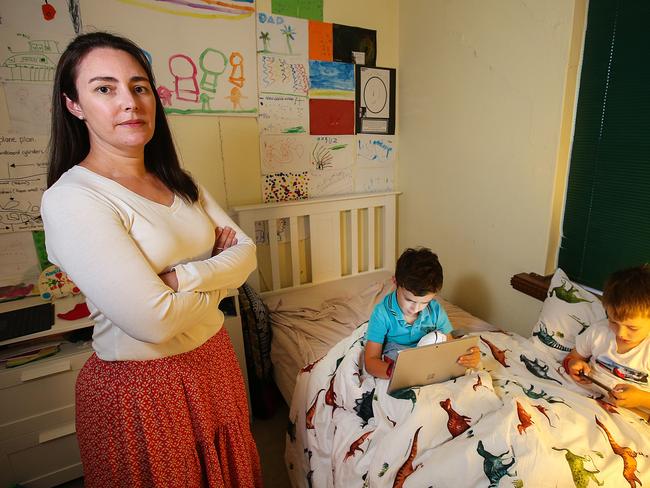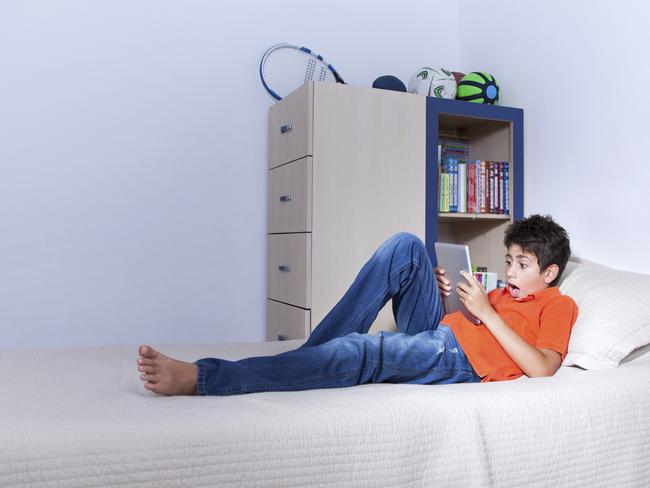Australian children are facing a sleep crisis due to excessive screen time
CHILDREN as young as three are showing up to pre-school and childcare massively sleep-deprived because of excessive screen time. Is your child getting too much?
Kids
Don't miss out on the headlines from Kids. Followed categories will be added to My News.
EXCLUSIVE
OUR kids are facing a sleep crisis due to their reliance on smartphones and tablets and it’s making them dumber, more depressed and less likely to succeed.
Children as young as three are showing up to pre-school and childcare massively sleep-deprived thanks to spending too much time on smartphones and tablets.
A staggering 17 per cent of kids aged three and under own their own smart device — including iPhones. This increases to 36 per cent for preschoolers.
News Corp Australia has uncovered the true extent of the problem of our addiction to screens and the impact it is having on our youngest children.
Many kids are getting several hours less sleep a night than the recommended guidelines because they are spending time on devices.
In one case, a five-year-old was referred to a sleep clinic because he was staying up until 10.30pm on his smart device.
The kindergarten-aged child — who owned his own iPhone — was falling asleep in school and was reaching for his screen first thing after waking at 6am.
The recommended sleep-hours for a five-year-old is 12.

In another case a seven-year-old boy was communicating with his parents regularly via his own iPhone, even when they were in the next room.
Experts warn the growing lack of sleep for our children could have a lasting impact on their health and have issued an urgent wake-up call to parents
Melbourne’s Royal Children’s Hospital’s child health poll found kids are spending an average of 32 hours a week on their devices — or 4.5 hours per day.
And 43 per cent of kids were using their smart devices at bedtime.
Chris Seton, paediatric sleep physician at Sydney’s Woolcock Institute of Medical Research, said the number of very young kids he was seeing with sleep issues due to increased device use was growing.
Dr Seton said devices impacted kids’ sleep in three main ways — they delay bedtime, cause “conditioned arousal” where the brain is trained not to associate a certain time of day or the bed as a place of sleep and the blue light in-built in screens prohibits the release of melatonin that prepares the body for sleep.
“A lack of sleep in kids means they are more prone to learning issues, obesity, a whole range of mood issues including depression and anxiety and they are at higher risk of suicide, drug, addiction and sexual promiscuity in older age,” he said.
“There is also research out of the US that is showing a narrowing of blood vessels behind the retina in one-year-old kids using devices.”
Harriet Hiscock, paediatrician with Melbourne’s Murdoch Children’s Research Institute, said Australian children were frequently getting less than the recommended sleep hours.
“Their quality of the sleep is also being impacted by devices and this is perhaps more important than duration,” Dr Hiscock said.
“When devices are in bedrooms this can be waking up children at night.”
Deputy Chair of the Sleep Health Foundation David Hillman said the increasing use of devices by children and the impact on sleep was an “enormous concern”.

He said children were becoming increasingly “addicted” to their devices which had the potential to impact their long term development.
“When children are short of sleep due to device use it means their moods change, they make poorer decisions and their learning is significantly impaired,” Professor Hillman said.
“We know that your early sleep habits often set up how you will sleep as an adult.
E-Safety Commissioner Julie Inman Grant said not all screen time was bad.
“When used as part of family life or for educational purposes, and in moderation it can offer enhanced learning experiences and improved motor, co-ordination, literacy and numeracy skills,” the top tech watchdog said.
However, she said “excessive screen time can lead to problems including sleep difficulties, increased risk of obesity and poor performance at school”.
Julie Green, executive director of the Raising Children Network, said strong screen time limits were necessary to help lower physical, developmental and safety risks to children.
“A family media plan can cover things like the quality of programs and apps, screen-free areas at home, for example bedrooms, screen-free times such as all screens off at bedtime, and charging devices in a central location,” Ms Green said.
Health Minister Greg Hunt said it was important for kids to get a good night’s sleep and that the new guidelines from the government recommended no sedentary screen time for children under the age of two.
“The advice of experts on suggested sleep times and screen times is great information for parents,” Mr Hunt said.
“It’s useful information for parents to consider when working out bedtimes, wake up times and routines.”
For more information on managing screen time head to: www.esafety.gov.au/iparent

STRUGGLE TO RESTRICT SCREEN TIME
Megan Keyes, 40, struggles to restrict her boys’ screen time use.
Angus, 6, and Sebastian, 4, ask daily to use the family’s iPads and also watch TV most days.
Ms Keyes said while she hadn’t particularly noticed an impact on her boys sleep — their moods are definitely affected by device use.
“I do notice their moods seem to change after they have been using screen time and for the worse,” she said.
“They are in a much more grumpy mood after watching TV or using the iPad or laptop.”
Ms Keyes said the family had also adopted the bad habit of giving the kids devices when at a restaurant in order to have a peaceful meal.
“It’s been tough to get them out of that habit and they don’t understand why we are saying no.”
She said the recommendations on screen time were not publicised enough and parents were often left in the dark about what was healthy and unhealthy device use.
“I do know of children that are quite young where the TV is on all day. It is just on in the background all the time or they are on their devices constantly,” Ms Keyes said.
“Their behaviour is horrible as a result.
“It is hard as a parent though constantly say no all the time and monitor their use and I can understand why other parents give in more.”

TOP TIPS FOR MANAGING YOUR KIDS SCREEN TIME AND SLEEP
1. Work out an appropriate bedtime for your child based on age sleep guidelines
2. No screens in the hour before bedtime
3. Start a regular pre-bedtime routine with your child in the 30 minutes before sleep. This should include reading a book with your child and brushing teeth and could include a bath and putting on pyjamas.
4. No devices in the bedroom. Never allow your child to use a device in bed to ensure a bed is associated with sleep not device use.
5. Make sure devices aren’t accessible to children without your permission
KEY FACTS ON OUR KIDS SCREEN TIME USE
— Infants and toddlers average 14 hours a week screen time
— Two to five year-olds average 26 hours a week screen time
— Six to 12-year age group average 32 hours per week screen time
— 13 to 18-year-olds average 44 hours a week screen time
*Source: Royal Children’s Hospital Child Health Poll

RECOMMENDED SCREEN TIME LIMITS
— Children under 18 months should avoid any screen time, other than video-chatting
— Children aged 18 months to 2 years can watch or use high-quality programs or apps if adults watch or play with them to help them understand what they’re seeing
— children aged 2-5 years should have no more than one hour a day of screen time with adults watching or playing with them
— children aged 6 years and older should have consistent limits on the time they spend on electronic media and the types of media they use.
*Source: American Academy of Pediatrics (AAP) recommended by Australia’s Raising Children Network.
RECOMMENDED SLEEP HOURS FOR CHILDREN
0-1 years: 14-17 hours
1-2 years: 12-15 hours
3-5 years: 10-13 hours
6-13 years: 9-11 hours (more in younger end of spectrum)
14-17 years: 8-10 hours


